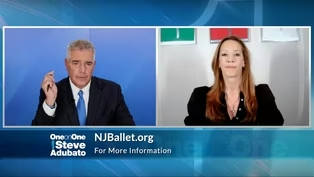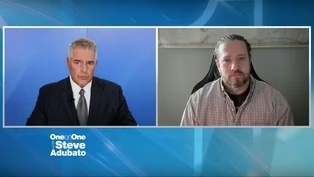One-on-One
Using the Orchestra to Unite Communities
Clip: Season 2023 Episode 2663 | 10m 49sVideo has Closed Captions
Using the Orchestra to Unite Communities
Rossen Milanov, Music Director of the Princeton Symphony Orchestra and internationally renowned conductor, joins Steve Adubato to talk about what drew him to the Princeton Orchestra, the role of music as a uniting force in the community, and his passion for educating our youth about classical music.
Problems playing video? | Closed Captioning Feedback
Problems playing video? | Closed Captioning Feedback
One-on-One is a local public television program presented by NJ PBS
One-on-One
Using the Orchestra to Unite Communities
Clip: Season 2023 Episode 2663 | 10m 49sVideo has Closed Captions
Rossen Milanov, Music Director of the Princeton Symphony Orchestra and internationally renowned conductor, joins Steve Adubato to talk about what drew him to the Princeton Orchestra, the role of music as a uniting force in the community, and his passion for educating our youth about classical music.
Problems playing video? | Closed Captioning Feedback
How to Watch One-on-One
One-on-One is available to stream on pbs.org and the free PBS App, available on iPhone, Apple TV, Android TV, Android smartphones, Amazon Fire TV, Amazon Fire Tablet, Roku, Samsung Smart TV, and Vizio.
Providing Support for PBS.org
Learn Moreabout PBS online sponsorship(upbeat music) - Classical symphony music - We are honored to be joined by Rossen Milanov, who is the Edward T. Cohen Music Director of an extraordinary organization and orchestra, the Princeton Symphony Orchestra.
Rossen, it's an honor to have you with us.
Thank you so much.
- Thank you.
It's my pleasure, Steve.
- We're putting up the website of the Princeton Symphony Orchestra.
Why?
Because we are part of a longstanding series called The Arts Connection, and our job, our mission, our joy is to be able to promote not-for-profit arts organizations.
Describe the Princeton Symphony Orchestra, please.
- Princeton Symphony has an extraordinary history.
We have serving our community interest, and we are in a way, very privileged to be located right in between two major cultural centers, such as New York City and Philadelphia.
But on the other hand, by being in Princeton, which excels in almost every way, but particularly in the areas of education and any areas of community development, it's very, it's a great privilege to us to be right in the middle of where people not only live, but where people go to school, people where they could enjoy art in a very immediate and stimulating way, such as in Princeton.
- Rossen, yeah, you're not gonna say this, but I will.
You're an internationally renowned conductor.
National, international presence and experience.
You have worked with and for and led such extraordinary organizations, including the Philadelphia Orchestra, conducted more than 200 performances.
With a national and international reputation that you have, why Princeton?
Why the Princeton Symphony Orchestra for you professionally and personally, please?
- Being in a smaller place and working with a smaller culture organizations provides you with agility and able to respond in a much quicker way in our planning, for instance, and our connections with the community.
And what drew me to Princeton, first of all, was the incredible support and popularity of this organization among the community, but also the very high artistic goals and dreams and plans that the organization has, not only presenting great music to the audience, but also connecting in a very meaningful way.
And for a person that is a product more or less of a little bit of a different type of society, I grew up in communist Bulgaria where art was something that was a privilege for everyone to experience.
It became a very big passion for me here in Princeton to make sure that more young people have the same access, the same outlet of expressing themselves through arts.
And Princeton Symphony here in the area has the reputation of making these connections possible for a lot of children.
- Rossen, listening to you talk about growing up in Bulgaria and how the arts were viewed or not viewed in a positive way and the opportunities were not there.
A lot of this is personal for you?
- A lot of this is personal for me because coming to the United States was a very fresh start in many ways for me, starting with a completely different culture, but knowing that I bring something quite unique because I already had finished my education and formed myself as a artist and a musician, having to go through a struggle of learning a foreign language, making new friends and experiencing a lot of, I would say, polar experiences on both ends while you have to set up in a new country and start your life new without having anything that is planned in advance.
So I feel very personally connected to the fact that what was given to me, I would say for granted when I was growing up, now I have to give back.
- Speaking about giving back, one of our long time friends, one of our trustees at the Caucus Educational Corporation, Pete Taff told us about you and your organization and one of the things he told us is that music education is a passion for you.
Is that part of the, is it the Listen Up program?
Is that what it's?
I know you do many programs.
- Yeah, but Listen Up is part of a much bigger program, which we call Bravo, that deals with different ways of creating this meaningful connections and experience for children of various ages.
So for us as Princeton Symphony, we view education as lifelong process and we have design programs that fit different individual groups, age groups.
So the Listen Up program is one of them, and it's unique because combines two kind of art forms, visual and musical art.
And the essence of that is to really stimulate the creativity of the children by exposing them to not only great music, but also to how the music could be translated in art, in visual art forms.
So what we do every year, we present a concert for them.
Most of the time it's actually music that is quite new, like written within the last five to 10 years.
So the children have absolutely no preconceived notion of what is classical and what is modern, and they respond in a very unique way.
- In the schools?
I'm sorry for interrupting.
You do those in the schools, at school presentations?
- No, this one is actually done in the Paul Robeson Center of the Arts in Princeton.
- Okay.
- Because a little bit more of a controlled environment.
In the schools our goal is to introduce children to live classical music.
So we send a group of four or five musicians that have normally developed a very interesting and interactive program that connects with the children and allows them to hear classical music for very first time, and at the same time have a physical contact with the instruments that produce the sound and get that hands-on experience that sometimes is so difficult for us to provide in order to decide what instrument to pick.
Normally there's somebody else that decides it for you.
- With social media being what it is and our attention spans like that, particularly for young people and the rest of us, harder to engage in classical music, listening to, enjoying experiences and experiencing it and being present without being distracted constantly by this, please?
- Yes, it is a challenge, just like for everybody.
I think for the parents, for the school teachers and for, certainly for concert experiences, but for what we try to do, we try our pieces that we select for, let's say children's concerts or any school concerts to be approximately the length of a pop song.
So we count that the music- - Three minute?
- Three, four minutes, five minutes, but already, - You'’re pushing it.
it pulls you in.
So I think you start with a baby step there, like not looking at your phone for five minutes, which is certainly something.
- It's a big deal.
Let me, I'm sorry to interrupt.
Before I let you go, talk to me about the Princeton Festival because you and your team are engaged and involved in leading that effort.
Real quick on that, if you could?
- The Princeton Festival is something that became part of our organization relatively recently, two years ago.
And we reinvented the location of the festival from being all over Princeton.
Now we have a performance venue, which is right on the grounds of the Morven Museum and Gardens, and there for almost two weeks.
There is an opportunity to hear just about any genre that exists under the big umbrella that we call music, including musical, opera, pops, children's concerts, chamber music, baroque music, just about anything, a little bit of everything for everyone so people could come and sample it, or in most cases, they could bring their entire family and experience what we call our family events that normally happen during the day, accompanied by all sorts of activities, musical instrument petting zoo, free gelato giveaways and games organized and just a great way for us to meet our great community, but at the same time, that unites us through music.
- Rossen, I'm gonna have people make sure they go through your website to find out more.
Rossen Milanov, who is Edward T. Cohen Music Director of the Princeton Symphony Orchestra.
We thank you so much and we wish you and your colleagues all the best.
Thank you.
- Thank you very much, Steve.
- You got it.
I'm Steve Adubato, that's Rossen.
We'll see you next time.
- [Narrator] One-On-One with Steve Adubato has been a production of the Caucus Educational Corporation.
Funding has been provided by Community FoodBank of New Jersey.
New Jersey Sharing Network.
The Turrell Fund, supporting Reimagine Childcare.
Hackensack Meridian Health.
The North Ward Center.
NJ Best, New Jersey'’s five-two-nine college savings plan.
Johnson & Johnson.
The Fidelco Group.
And by Horizon Blue Cross Blue Shield of New Jersey.
Promotional support provided byROI-NJ.
And by Insider NJ.
At the Community Food Bank of New Jersey, we are working now more than ever to fill the emptiness caused by hunger.
We are the state's largest anti-hunger organization.
And together with our 800 plus community partners, we are committed to delivering food, help, and hope, to our hundreds and thousands of neighbors in need.
The Challenges Facing the Performing Arts Community Today
Video has Closed Captions
Clip: S2023 Ep2663 | 9m 54s | The Challenges Facing the Performing Arts Community Today (9m 54s)
The Impact of Space Weather on our Daily Lives
Video has Closed Captions
Clip: S2023 Ep2663 | 7m 11s | The Impact of Space Weather on our Daily Lives (7m 11s)
Providing Support for PBS.org
Learn Moreabout PBS online sponsorship
- News and Public Affairs

Top journalists deliver compelling original analysis of the hour's headlines.

- News and Public Affairs

FRONTLINE is investigative journalism that questions, explains and changes our world.












Support for PBS provided by:
One-on-One is a local public television program presented by NJ PBS

